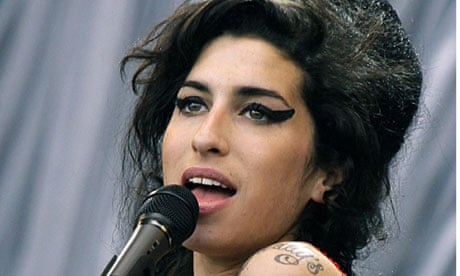A second inquest into the death of singer Amy Winehouse has confirmed that she died of alcohol poisoning after binge drinking following a period of abstinence.
The inquest into the 27-year-old Grammy award winner's death was held after an investigation found the original coroner, Suzanne Greenaway – who was hired by her husband, Dr Andrew Reid, the coroner for inner north London – did not have the correct qualifications for the role.
Greenaway stepped down in November when it emerged she did not have the requisite five years' experience in the Law Society, and Reid resigned from his position in December.
The singer was found dead in her flat in Camden, north London, on the afternoon of Saturday 23 July 2011. The new inquest repeated the findings that Winehouse had 416mg of alcohol per decilitre in her blood, enough to make her comatose and depress her respiratory system. She was found dead by paramedics, fully clothed, with a laptop on her bed and empty bottles of vodka on the floor.
Recording a verdict of misadventure, the St Pancras coroner, Dr Shirley Radcliffe, said: "She voluntarily consumed alcohol, a deliberate act that took an unexpected turn in that it caused her death."
The inquest heard a statement from Winehouse's GP, Dr Christina Romete, who described the singer as single-minded and intelligent. She said Winehouse had been battling her alcohol addiction but had repeatedly refused psychiatric help because she thought it would affect her creativity and had repeatedly lapsed into drinking binges following dry periods.
Winehouse had a well-documented drug habit, regularly using heroin, crack cocaine and cannabis – but had stopped taking drugs before a trip to St Lucia, where her alcohol consumption became increasingly problematic.
On returning to the UK, she fell into a pattern of abstaining from drink for a few weeks, then lapsing, according to Romete. She was taking medication, Librium, to cope with alcohol withdrawal and anxiety, and had been reviewed by a psychologist and a psychiatrist last year.
The doctor saw Winehouse the night before she died, when she had been drinking and seemed "calm and somewhat guilty". Winehouse had told her she had not had a drink since 3 July, but had started again on 20 July. She told the doctor she had started drinking because "she was bored" and apologised several times for wasting her time.
Romete said in her statement that when she asked Winehouse if she was going to stop drinking, "she said she didn't know". Though concerned that she was drinking, Romete was not worried about a risk of suicide: "She specifically said she did not want to die.".
The inquest also heard a statement from Andrew Morris, Winehouse's bodyguard, who lived at her home, and described their relationship as that between a "brother and sister". He had returned from leave three days before her death, and knew she had been drinking, though not an extraordinary amount. Over the next two days, he said, she drank moderately. "I had seen her drunk enough times in the past to know when she had drank too much."
On Friday night he could hear her "laughing, listening to music and watching TV" in her room, they had watched YouTube videos of her earlier performances and he last spoke to her at 2am on the Saturday. He checked on her at 10am, but when she didn't move when he entered the room he thought she was asleep.
At 2.30-3pm "it was still quiet, which seemed strange" so he checked on her again. "She was in the same position as in the morning. I checked her pulse but I couldn't find one." After paramedics confirmed she was dead, he said he was "upset and shaken, she's like a sister to me".
Pathologist Michael Sheaff, who did not perform the original autopsy in October 2011, gave evidence to confirm the findings of pathologist Suhail Baithun. He confirmed the amount of alcohol in Winehouse's blood, saying that levels of 350mg of alcohol in the blood were associated with fatalities.
Recording her verdict, the coroner said Winehouse had died from "alcohol toxicity", adding that it was "a level of alcohol commonly associated with fatality". She said Winehouse "voluntarily consumed alcohol" and added that "two empty vodka bottles were on the floor" beside her bed when her body was discovered. She expressed her condolences to Winehouse's parents, Mitch and Janis, who did not attend the inquest, marking the loss of "a talented woman at such a young age".
